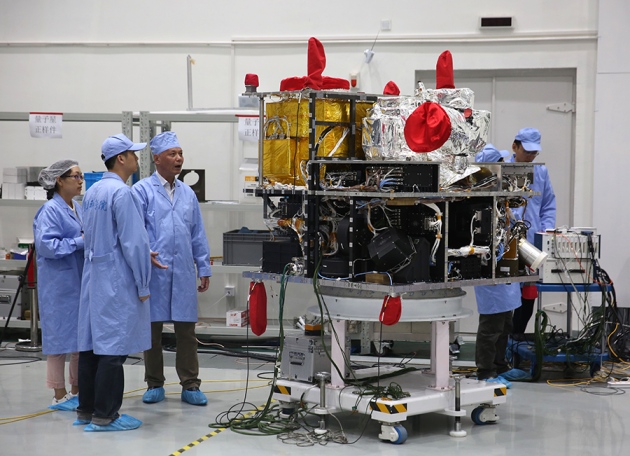beijingwalker
ELITE MEMBER

- Joined
- Nov 4, 2011
- Messages
- 65,187
- Reaction score
- -55
- Country
- Location
Follow along with the video below to see how to install our site as a web app on your home screen.
Note: This feature may not be available in some browsers.




US state department spokesperson: The United States condemn China for hacking us and making thousands Snowden lose job.
Photo taken on May 25, 2016 shows the quantum simulation laboratory under the Chinese Academy of Sciences, in Shanghai, east China. China plans to launch the world's first quantum satellite that can achieve secure communication in July. The satellite is dedicated to quantum science experiments. (Xinhua/Cai Yang)
Photo taken on May 25, 2016 shows the quantum satellite assembly workshop at Shanghai Engineering Center for Microsatellites, under the Chinese Academy of Sciences, in Shanghai, east China. China plans to launch the world's first quantum satellite that can achieve secure communication in July. The satellite is dedicated to quantum science experiments. (Xinhua/Cai Yang)
General engineer Zhu Zhencai introduces the "quantum entanglement source" on the quantum satellite at Shanghai Engineering Center for Microsatellites, under the Chinese Academy of Sciences, in Shanghai, east China, May 25, 2016. China plans to launch the world's first quantum satellite that can achieve secure communication in July. The satellite is dedicated to quantum science experiments. (Xinhua/Cai Yang)
Deputy chief engineer Zhou Yilin (3rd L) discusses with other technicians beside the quantum satellite at Shanghai Engineering Center for Microsatellites, under the Chinese Academy of Sciences, in Shanghai, east China, May 25, 2016. China plans to launch the world's first quantum satellite that can achieve secure communication in July. The satellite is dedicated to quantum science experiments. (Xinhua/Cai Yang)
General engineer Zhu Zhencai (4th R), deputy chief engineer Zhou Yilin (4th L) and other staff members pose for a group photo with the quantum satellite at Shanghai Engineering Center for Microsatellites, under the Chinese Academy of Sciences, in Shanghai, east China, May 25, 2016. China plans to launch the world's first quantum satellite that can achieve secure communication in July. The satellite is dedicated to quantum science experiments. (Xinhua/Cai Yang)
Pan Jianwei, a Chinese quantum scientist and professor at the University of Science and Technology of China, demonstrates quantum communication, in Shanghai, east China, May 25, 2016. China plans to launch the world's first quantum satellite that can achieve secure communication in July. The satellite is dedicated to quantum science experiments.(Xinhua/Cai Yang)

Photo taken on May 25, 2016 shows the quantum simulation laboratory under the Chinese Academy of Sciences, in Shanghai, east China. China plans to launch the world's first quantum satellite that can achieve secure communication in July. The satellite is dedicated to quantum science experiments. (Xinhua/Cai Yang)

US state department spokesperson: The United States condemn China for hacking us and making thousands Snowden lose job.


It will assist in the sending of data securely - and be a huge benefit in the fight against hackers - but cause widespread concern that the secretive communist state is pioneering its use.















